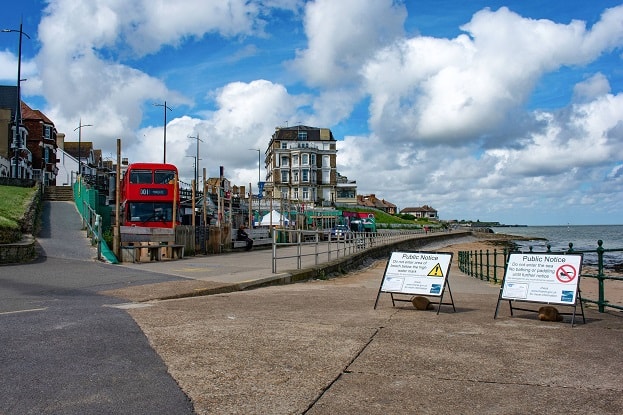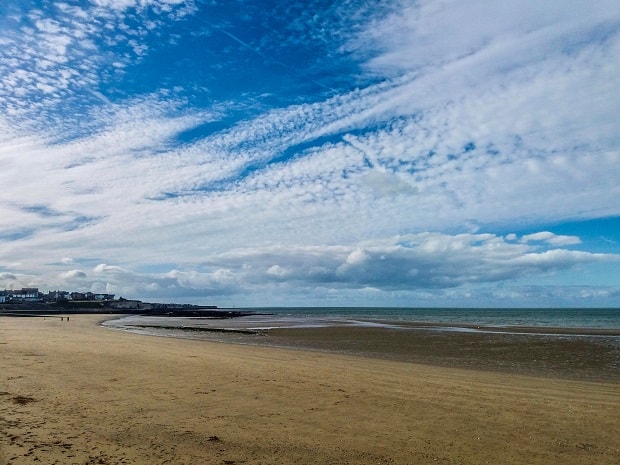
The Department for Environment, Food and Rural Affairs (Defra) has released the latest data for water quality across the country.
In Thanet the rankings are good news for Viking Bay which is graded as Good, an improvement from 2021 which marked it as sufficient.
Walpole Bay and West Bay at Westgate had been rated as Excellent for 2021 but now rank as Good. All other ratings remain unchanged from the 2021 data.
| Minnis Bay, Birchington | Excellent |
| West Bay, Westgate | Good |
| St Mildred’s Bay, Westgate | Excellent |
| Westbrook Bay, Margate | Excellent |
| Margate The Bay | Excellent |
| Margate Fulsam Rock | Excellent |
| Walpole Bay, Margate | Good |
| Botany Bay, Broadstairs | Excellent |
| Joss Bay, Broadstairs | Excellent |
| Broadstairs, Stone Bay | Excellent |
| Broadstairs, Viking Bay | Good |
| Ramsgate Sands | Good |
| Ramsgate Western Undercliffe | Good |
| Sandwich Bay | Excellent |
For every designated bathing water in England, the Environment Agency monitors Escherichia coli and intestinal enterococci in the water, throughout the bathing season (15 May to 30 September). Values can vary; depending on the weather, pollution from agricultural and urban sources, storm water overflows, amongst other factors. The readings taken over the last four bathing seasons then determine the annual classification for that water.
Due to Coronavirus restrictions during the 2020 bathing water season, there was no classification in 2020. The 2022 classification results cover the period from 2018 to 2022 (excluding 2020).
For Kent there are 17 ‘Excellent’ bathing waters, 10 ‘Good’, 1 ‘Sufficient’ and 1 Poor.
Storm overflow discharges

Since 2015 the Environment Agency has required water companies to install Event Duration Monitors at bathing water sites. This captures data on the frequency and duration of storm overflow discharges, with all the data published online so the public can see what is happening in their area. More than 12,000 of England’s 15,000 storm overflows now have these monitors, and the remaining 3,000 will have them by end of next year.
As part of the Government’s Storm Overflows Discharge Reduction Plan, water companies must improve all storm overflows discharging into or near every designated bathing water by 2035; and improve 75% of overflows discharging to high priority nature sites by 2035.
Toby Willison, Southern Water’s Director of Quality and Environment, said: “We play our part in improving the standard of bathing waters, through major investments in treatment works along our 700 miles of coast – and we are working hard to extend our efforts and partnerships with other agencies to make an even bigger positive impact.
“Customers rightly expect the water industry to eliminate the use of storm overflows, and we are developing our own plans to tackle this issue, while continuing to protect people’s homes from flooding.
“And while we have an important role to play in enhancing and maintaining water quality, there are a wide range of pollutions which have an impact – contaminated rainwater running off roads and agricultural land, wastewater from privately owned treatment works, boats and animals on the beach such as dogs and seabirds, and the overall steep rise in bathing water users all play a part. That’s why it is so important for all parties to work together.”
Southern Water’s Cleaner Seas and Rivers Taskforce is exploring engineering and nature-based solutions to ‘slow the flow’ of excess rainwater into sewers, which leads to overflows permitted by the Environment Agency.
Toby added: “During the 2022 bathing water season, we saw half the storm overflows of a year earlier, in part due to dry weather. And our analysis shows that bathing waters rated ‘Poor’ also saw fewer releases. This underscores just how many variables there are, and why it is so important that we continue to work closely with local councils and other partners to understand and tackle all causes.”
‘Hard work’

A Thanet council spokesperson said: “There has been a great deal of hard work to help improve the quality of the bathing water along Thanet’s coastline. In particular, there has been considerable help from a range of community groups to ensure that Viking Bay has continued to improve.
“Beach management initiatives have included litter picks, additional waste and recycling bins, and tackling anti-social behaviour in the area. There is also a dog Public Spaces Protection Order (PSPO), which was renewed in 2020 and lists the beaches that welcome dogs during peak season or stipulates time and on/off lead restrictions.
“In addition, our Beach and Coast PSPO Code of Conduct outlines rules surrounding specific activities, to ensure that beach users respect our beaches, wildlife and other beach users.
“We are committed to continuing these initiatives to ensure that bathing water quality is improving or maintained at all of our bays.”
Classifications
Excellent – the highest, cleanest seas
Good – generally good water quality
Sufficient – the water meets minimum standards
Poor – the water has not met the new minimum standards. Work is planned to improve bathing waters not yet reaching Sufficient
If water is classified as poor, then a sign advising against bathing will be displayed. However the beach remains open for people to enjoy.

